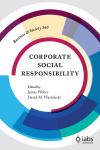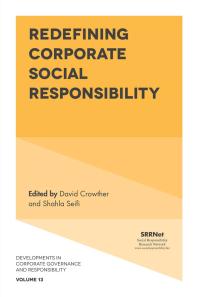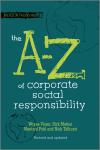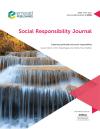What is Social Responsibility?
According to Investopedia, social responsibility means that businesses, in addition to maximizing shareholder value, must act in a manner benefiting society, not just the bottom line. This means businesses may:
- adopt policies that promote the well-being of society and the environment while lessening negative impacts on them.
- act responsibly in many ways, such as by promoting volunteering, making changes that benefit the environment, engaging in ethical labor practices, and engaging in charitable giving.
-
change company policies to improve or benefit the environment: Companies are holding tree-planting events, minimizing paper waste, switching to energy-saving bulbs, setting up recycling bins and allowing remote work to reduce the negative impact of commuter traffic.
This idea also may include corporate social responsibility (CSR) where businesses self-regulate to be socially accountable to itself, its stakeholders, and the public. Engaging in CSR means that, in the ordinary course of business, a company is operating in ways that enhance society and the environment instead of contributing negatively to them.
Companies may also consider environmental, social, and governance (ESG) scores as a way to measure sustainability and ethical performance. Many agencies measure ESG using their own rating systems including Bloomberg ESG Data, Dow Jones Sustainability World Index, Sustainalytics, MSCI and IRIS Carbon. Criteria for ESG Scores may include environmental issues (Carbon footprint, Energy efficiency, Renewable energy usage, etc.), social issues (Labor practices, Pro-diversity efforts, Human rights, etc.) and governance issues (Board diversity and structure, Executive compensation, Shareholder rights, etc.).
You can find ESG scores for companies for free by using Yahoo Finance Sustainalytics, using MSCI website, Corporate sustainability reports in the "Investor Relations" or "Sustainability" section of company websites or profiles, or by reviewing CDP data.
Text from Investopedia and Indeed.
Examples of Social Responsibility Today
Some Examples of Corporate Responsibility:
- LEGO: The toy company has invested millions of dollars into addressing climate change and reducing waste. LEGO’s environmentally conscious efforts include reduced packaging, sustainable materials, and investments in alternative energy.
- TOMS: TOMS donates one-third of its net profits to charities that support physical and mental health as well as educational opportunities. During the pandemic, the brand directed all charitable donations to the TOMS COVID-19 Global Giving Fund.
-
At Ben & Jerry’s, positively impacting society is just as important as producing premium ice cream. In 2012, the company became a certified B Corporation, a business that balances purpose and profit by meeting the highest standards of social and environmental performance, public transparency, and legal accountability. As part of its overarching commitment to leading with progressive values, the ice cream maker established the Ben & Jerry’s Foundation in 1985, an organization dedicated to supporting grassroots movements that drive social change. Each year, the foundation awards approximately $2.5 million in grants to organizations in Vermont and across the United States. Grant recipients have included the United Workers Association, a human rights group striving to end poverty, and the Clean Air Coalition, an environmental health and justice organization based in New York.
-
Starbucks launched its first corporate social responsibility report in 2002 with the goal of becoming as well-known for its CSR initiatives as for its products. One of the ways the brand has fulfilled this goal is through ethical sourcing. In 2015, Starbucks verified that 99 percent of its coffee supply chain is ethically sourced, and it seeks to boost that figure to 100 percent through continued efforts and partnerships with local coffee farmers and organizations. The brand bases its approach on Coffee and Farmer Equity (CAFE) Practices, one of the coffee industry’s first set of ethical sourcing standards created in collaboration with Conservation International. CAFE assesses coffee farms against specific economic, social, and environmental standards, ensuring Starbucks can source its product while maintaining a positive social impact.
Some Company Ranking Websites for Corporate Social Responsibility (CSR):
-
Organisation for Economic Co-operation and Development Corporate Governance Website and FactbooksGlobal website examining how companies work within society as well as maintain profitability responsibly. Also see the OECD Factbooks
Social Responsibility Books

Corporate Social Responsibility by James Weber and David M. Wasieleski
Online book. Broad overview of the development and current "state" of the research and theoretical developments corporate responsibility.
TIP: use the search feature in this online book to find topics.

Growing Local Value : How to Build Business Partnerships That Strengthen Your Community by Laury Hammel , and Gun Denhart
Available online. Growing Local Value shows how to build a values-driven business that is deeply embedded in local life.Drawing on real-world examples from Greyston Bakery, Wild Planet Toys, Powell's Books, and many other companies, Laury Hammel and Gun Denhart show how you can leverage every aspect of your business--from product creation to employee recruitment, vendor selection, and raising capital--to benefit both the community and the bottom line.

Redefining Corporate Social Responsibility by David Crowther and Shahla Seifi
Available online. Provides case studies about corporate social responsibility from around the world with consideration to different cultures and disciplines of study.
Ethical Chic: the inside story of the companies we think we love
Available in Verdugo Library: Call number: 658.408 H399e
Author Fran Hawthorne uses her business-investigative skills to analyze six favorites: Apple, Starbucks, Trader Joe's, American Apparel, Timberland, and Tom's of Maine. More than a how-to guide for daily dilemmas and ethical business practices, Ethical Chic is a blinders-off look at the mixed bag of values on sale at companies that project a seemingly progressive image. Derived from book jacket.

Taking sides. Clashing views in business ethics and society by Gina Vega
Available in Verdugo Library: Call number: 174.4 T136, 2016. Opposing viewpoints on the ethics of corporations including social responsibility, employee monitoring, compensation, and mechanized labor.

The A to Z of Corporate Social Responsibility by Wayne Visser, , Dirk Matten, , Manfred Pohl, , and Nick Tolhurst
Available online. Dictionary of terms related to corporate social responsibility.
TIP: search within book using keywords like accountability, environment auditing, etc.

When principles pay : corporate social responsibility and the bottom line by G.M. Heal
Available in Verdugo Library: Call number: 658.408 H434w
Geoffrey Heal presents an examination of how social and environmental performance affects a corporation's profitability and how the stock market reacts to a firm's social and environmental behavior.

Exploring Spirituality and Social Responsibility by Nitha Palakshappa , and Madhumita Chatterji
Available online. This special issue of Social Responsibility Journal “exploring spirituality and social responsibility” allows us to consider questions associated with the integration of spirituality into contemporary business practice and what, if any, role it has. As such, this issue will be of interest to both scholars and practitioners.

Beyond the bottom line : putting social responsibility to work for your business and the world by Joel Makower
Available in Verdugo Library: Call number: 658.408 M235b
Whether you run a company or just work for one, you’ll find here abundant inspiration and examples of how businesses can safeguard the environment and improve the lot of their employees, their communities, and the world beyond while ensuring their own long-term profitability.